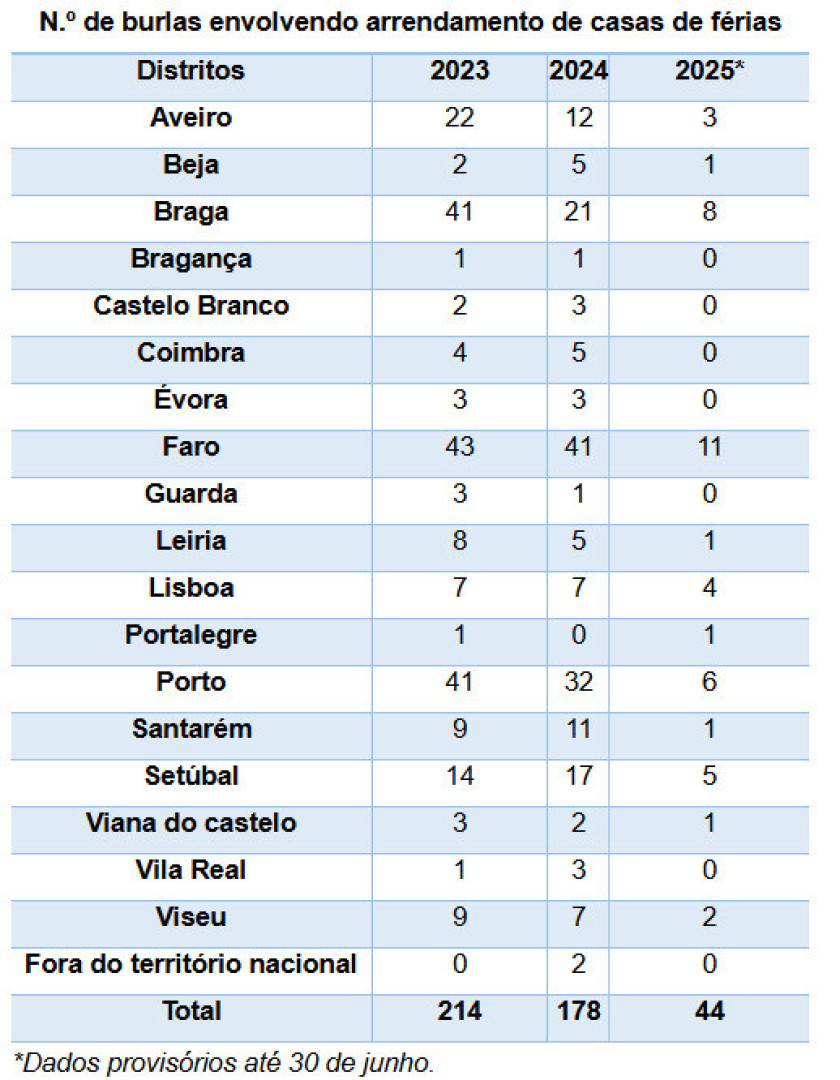The number of vacation home rental scams has been decreasing over the past three years.
Data released by the National Republican Guard (GNR) in a statement this Friday shows that 214 cases of vacation home rental scams were reported in 2023. The following year saw a 16.8% reduction in this crime, with 178 cases recorded.
For this year, the data is still provisional (and only includes numbers up to June 30) but already seems promising. In six months, only 44 cases of vacation home rental fraud were recorded across the country, in GNR’s jurisdiction areas.
In total, from 2023 to June 30 of this year, the GNR registered 436 vacation home rental scams.
PSP Data
The opposite trend is observed in PSP data, where complaints have been increasing.
Data published today by Jornal de Notícias regarding false vacation home rentals in the first half of this year shows 748 complaints, a 17% increase compared to the same period in 2024.
Between 2023 and June 30 of this year, the PSP recorded 3,801 cases of fake vacation rentals.
Areas with the Highest Incidence
The National Republican Guard highlights the districts of Faro, Porto, and Braga as the most affected by this type of scam over the past three years.
The list, in order of incidence, is as follows:
- Faro – 95
- Porto – 79
- Braga – 70
- Aveiro – 37
- Setúbal – 36
- Santarém – 21
- Viseu – 18
- Lisboa – 18
- Leiria – 14
- Coimbra – 9
- Beja – 8
- Évora – 6
- Viana do Castelo – 6
- Castelo Branco – 5
- Guarda – 4
- Vila Real – 4
- Bragança – 2
- Portalegre – 2
In 2023, the GNR reported the arrest of 60 individuals suspected of vacation home rental fraud. The following year, this number decreased to less than half, with 29 arrested. This year, up to the end of June, 12 people have been arrested.
Regarding suspects, the GNR identified 140 in 2023, 138 in 2024, and only 33 in the first half of this year.

How This Crime Occurs
The GNR has not identified any specific rules or patterns for how this crime is carried out, stating that “there are multiple methods used to achieve the same goal.”
Commonly, suspects post rental advertisements for homes at below-market prices on high-visibility sites. Often, fake ads are accompanied by photos of real properties.
When contacted by an interested client, the suspect requests a payment known as a “signal” — a sum of money to “secure” the home — thereby committing the fraud.
In GNR records, victims usually only realize they have been scammed months later when the alleged “owner” stops responding, when they try to retrieve the house keys, or even upon verifying the address and finding it doesn’t exist.
GNR Advice
The National Republican Guard advises citizens to be more vigilant and immediately suspicious of rental prices that are significantly below the market rate, especially considering other homes in the area.
Another way to prevent fraud is to request an in-person viewing of the property. This can allow you not only to gauge the owner’s response (if they “show hesitation,” “be suspicious,” says the GNR) but also to confirm if the images on the site match reality.
If you can’t visit the property, you can always check multiple platforms to see if the advertiser is the same, if the house is in the same location, and if rental prices differ. You can also ask the owner for more interior photos of the house to determine whether it is a scam.
Lastly, the GNR advises being cautious if the owner asks for a “signal” under the pretext of having many interested parties.
When transferring money via ATM, always confirm that the account holder matches the advertiser’s name, and if you receive a message stating that payment was not received, always contact your bank to confirm.




